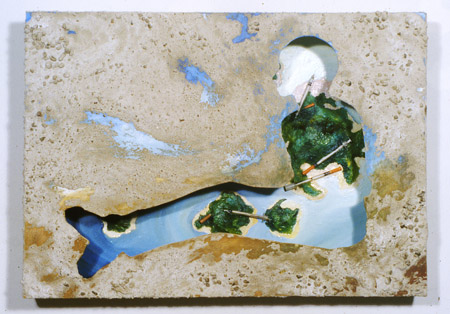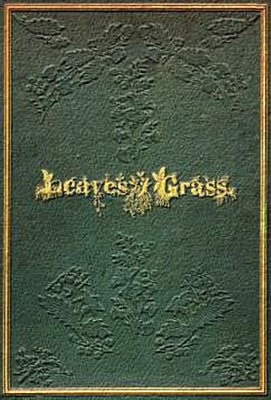Serendip is an independent site partnering with faculty at multiple colleges and universities around the world. Happy exploring!
Notes Towards Day 2 (Thurs, Jan 19): Re-thinking Genre as a Gift Economy


No Man Is An Island (mixed media)
"No man is an island, entire of itself; every man
is a piece of the continent, a part of the main"
(John Donne, Meditation 17).
"All mankind is of one author, and is one volume"
(John Donne, via Jonathan Lethem,
who also said,)
"the kernel, the soul...of all human utterances--is plagiarism. For substantially all ideas are secondhand, consciously and unconsciously drawn from a million outside sources...there is not a rag of originality about them anywhere except the little discoloration they get from...temperament....by necessity...we all quote."
That's the claim we'll be worrying today.
Do we believe this? And if we do, what do we do about it?
What does it mean for our writing practices?
I. but first: welcome back....!
coursekeeping: reviewing the logistics of
how we're going to work together this semester
* did y'day's internet black-out affect you @ all?
are you taking a stand/signing the petition?
I forgot a couple of things!
* overall arc of the course (!):
emerging genres of 1) academic writing 2) graphic narrative
(and academic writing about it) and then! 3) we'll select a 3rd/4th genre
together, based on your interests (deliberate, before-spring-break process...)
* also! when you register on Serendip,
think about your user-name
(how recognizable do you want to be on-line?)
and about an avatar you might you to "illustrate" your voice
* how's the Serendip registration coming?
(I see 11 members so far....two 2 w/ avatars!
also! this handy toolbar on the lefthand side will serve many of your group needs...)
* instructions for weekly postings --by 5 p.m. on Sunday evening
post on-line some reflections about writing in your discipline--
(or: if you don't have one yet, "college-level writing"):
what do you understand (from the discussion we're about to have...
or others/other instruction you've had)
about the conventions = genre of academic writing?
what ideas do you have about (digitally initiated?)
transformations of your own writing, or that in your discipline?
for Tuesday's class, we'll be exploring some
new digital possibilities in academic writing
(as today's essays suggest, the digital world is putting pressure on/
making visible practices that have long been "common")
read Digital Humanities Manifesto 2.0 (click on the pdf!) and
three recent BMC digital senior projects:
A Moment's Ornament (Aya, Summer 2011)
Seeing Stigma (An Active Mind, Spring 2011)
Mooring Gaps: Marianne Moore's Bryn Mawr Poetry (Jen Rajchel, Spring 2010)
The authors, Aya Martin-Seaver, Jen Rajchel and Clare Mullaney
(a senior and two recent grads) will be joining us for class.
other questions/concerns/thoughts/responses re: course requirements?
sign in sheet: with your on-line name (other info, if you've just arrived...)
shape of this course responsive to who's here
(also important, in the "gift economy" of this class,
to know one another's names!....
and I need company in the process...!)
so go 'round: naming yourself,
what "genre" (=kind) of student you are,
and also your favored cultural "genre"/kind
II. reading for today: something you wrote yourself,
which we're going to re-read/re-think together,
through three lenses, all written four years ago:
Jonathan Lethem's piece on "The ecstasy of influence: a plagiarism,"
from Harper's Magazine, the oldest general interest monthly in America
Folsom & Stallybrass's essays on "Remapping Genre," published in
the archetypal/ prototypical journal of the profession of literary studies,
Publication of Modern Language Association
--anyone read essays from either source before?
in what context/with what instructions re: "uptake"?
start by thinking about how these works are written:
what are the generic characteristics of
the magazine reflection and academic essay?
as Tuesday: "moving up one level of abstraction":
write down/up 3 characteristics of each
how do you know you are reading one or the other?
how do they differ?
how does each signal to you how to read it?
what are the reading clues/directions/presumptions?
do they do any genre-bending? fail to fulfill any expectations?
(see the end of Lethem's essay: "Key: I is Another")
my intention that we will do some serious
"genre-bending" in our own essays this semester-->
using images, speaking personally (?), posting on-line, writing to a larger audience;
not assuming a captive one (a professor who has to read it)
but using methods of trying to reel in other readers....
but/so: to bend the genre, we need to understand how it works,
why it works that way, what's useful/not about its conventional working(s);
so, let's talk first about the sort of writing you've been doing so far,
see if we see any space for useful innovation
III. share your essay w/ a partner-->
read it over/write down/then tell her what you see in her work:
you're looking not for the argument, or "how well" it's written,
but attending rather to HOW it's written-->
[same series of questions we used on Harper's and PMLA]
*what genre is it?
*what are its generic characteristics?
*how do you know what you are reading?
*what are its defining characteristics?
*what form does it follow?
*how does it signal to you how to read it?
*what are the clues?
*are you its intended reader?
*how might it be revised to make you one??
*In Lethem, Folsom and Stallybass's terms, how does it "think,"
"think with,"or "think against" other forms?
re-thinking these essays through Stallybrass's invitation
to "discover a pedagogy that preceded regime of originality:
imitation, inspiration, use of common treasury
give up claim to intellectual property, in construction of free circulation of knowledge...."
how "original" do they try to be?
how do they mark themselves as being original?
how much do they rely on imitation, inspiration, the "use of a common treasury"?
*In what ways are they individualized, imitative, collaborative, creative?
I first encounted Lethem's essay in an 11/16/11 Digital Brown Bag on
Copyright, citation and plagiarism in the digital age,
which really became a discussion about collaborative working practices.
Mirella was there, and asked:
how do you define your own idea? What qualifies?
talking through: you come up w/ more…
“I’ve got an idea”—from reading, discussion—> isn’t your own!
can there really be such a thing? (then: how cite?)
how recognize all formed by what we’ve read, found influential--
what burden on us to acknowledge that, what gained?
attribution: placing yourself w/in existing scholarship:
awareness of how it fits in the greater whole
crisis of understanding because context has changed so much:
w/ smaller fields of shared knowledge and
larger fields of available knowledge --->
what are our obligations to others?
anxiety as a student: when do you stop researching?
how much are you accountable for?
is citation policing sources, or recording the network?
what might be good practices?
What do students need to know, and to practice?
What do you think about the possibility/reality of the academy as a "gift economy"?
with "the name of the game Give All" (Lethem)?
"freed from the tyranny of proprietary authors,
solitary thinkers who produce knowledge our of their own minds" (Stallybrass)?
----
V. Reading Notes
Lethem's "The ecstasy of influence: a plagiarism":
cryptomnesia/"higher cribbing"/recasting familiar themes/appropriation =all art
plunder/plagiarism/"cut-up method"
open-source culture/recombinant nature of means of production
("technology has only multiplied the possibilities")
collage the sine qua non of the creative act (mimicry, quotation, allusion, sublimated ocllaboration)
"we want more plagiarism"
"finding one's voice is...adopting and embracing filiations, communities, and discourses"
(vs. modernism's "contamination anxiety")
surrealists' attempts to reanimate things dulled by everyday use/make the familiar strange
copyright an ongoing social negotiation; restrictions bizarre and arbitary
"You wouldn't steal a handbag!" This conflation forms an incitement to quit thinking.
appropriation of "intellectual property" leaves the original untouched (Jefferson)
copyright not a "right" but a monopoly on use
"the beauty of second use": active reading "an impertinent raid ont he literary preserve"
"Readers are like nomads, poaching their way across fields they do not own"
"source hypocrisy," disnial, imperial plagiarism
"I'm a writer who likes to be influenced."
market vs. gift economies:
a gift establishes a feeling-bond between people; a sale leaves no connection
disconnectedness a virtue of the commodity mode
cf. the uncomodifiable=inalienable (art, a gift, vs. ad, never)
gift economies=public commons (of language: altered by every contributor, belonging between)
undiscovered public knowledge questions "the truly novel"-->
"have we just forgotten a worthy precursor?"
"might we be better off ratifying the ecstasy of influence"?
"the kernel, the soul...of all human utterances--is plagiarism. For substantially all ideas are secondhand, consciously and unconsciously drawn from a million outside sources...there is not a rag of originality about them anywhere except the little discoloration they get from...temperament...by necessity...we all quote."
"we too often, as hucksters and bean counters in the tiny enterprises of our selves, act to spite the gift portion of our privileged roles"
"As a novelist, I'm a cork on the ocean of story, a leaf on a windy day. Pretty soon I'll be blown away....The name of the game is GIve All."
From a Collection of Essays on The Changing Profession:
Ed Folsom, "Database as Genre: The Epic Transformation of Archives"
Whitman tested the rigid quality of our categorical systems: genre-bending/
battled with the "feudal mind-set"/division/discrimination that genre encouraged
his "Leaves of Grass" were "a Manifesto of nomadic thought,"
casually related to a motley tangle of other work:

"Look closely at Whitman's design of the floriated words 'Leaves of Grass' on the cover of his first edition -- the letters obscured with leaves and dangling roots, the title trope a continual reminder of surprising connections (leaves of grass as death emerging into life again and again), of transfer of atoms, of interpenetrating force fields .... Whitman's work ... is causally related to a motley tangle of other work .... Scripture and journalism, epic and etiquette manual, sublime transcendental philosophy and obscene filth....
What happens, then, when we move Whitman's rhizomorphous work into a database, put it online, allow for the webbed roots to zig and zag with everything the database incorporates?" (Folsom, 1573).
Folsom follows Manovich's provocative claim that "the database represents the world as a list of items, and it refuses to order this list. In contrast, a narrative creates a cause-and-effect trajectory of seemingly unordered items (events). Therefore, database and narrative are natural enemies .... database ... threatens to displace narrative, to infect and deconstruct ... endlessly ....
He argues that, since for Whitman, "the world was a kind of preelectronic database," he was "an early practitioner ... of the database genre," with a "relentless appetite for details, for every speck ... democratic beauty was fullness, not exclusion, and required...completeness, not a discriminating eye."
go exploring for yourself in the Walt Whitman Archive; test out Folsom's claims
One response was Peter Stallybrass, "Against Thinking":
digital information profoundly undermines academic elite control over the circulation of knowledge
gatekeepers' work is increasingly problematic
renewed sense of language as a "tissue of quotations" from which we cannot remove ourselves:
"Having 'inventory' is a requirement for 'invention'...making information reuseable."
databases can help free us from the tyranny of proprietary authors,
solitary thinkers who produce knowledge our of their own minds


